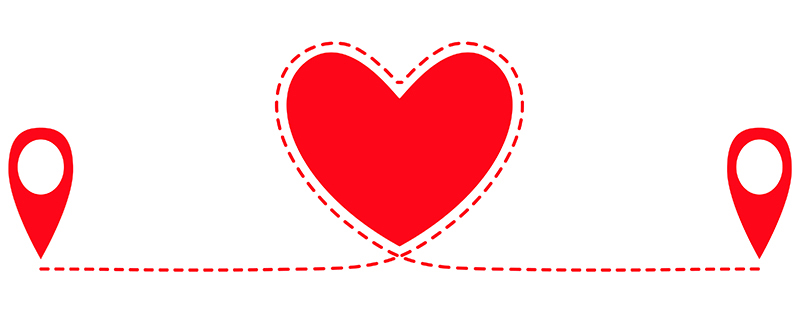Being married for 30 years and not knowing we were a neurodiverse couple until our 29th year of our marriage created a lot of “unintentional” hurt and pain for both of us. Learning we had differently wired brains helped me see our challenges and differences through a new lens, which led to forgiveness, healing, and emotional growth.

My ex and I divorced in 2018. However, I still love and care about him, and probably always will. We have the most amazing adult daughter in the universe, and she is an awesome combination of the best of us. In addition to creating her own amazing tapestry, she also has threads of my ex and I woven into her DNA that make her my favorite person in the world!
I am also very grateful for the 32 years my ex and I shared together. He was one of my best friends and my life partner for most of my adult life. However, I also know that, because we both loved each other deeply and I wanted to help him succeed in every aspect of his life, our relationship became “co-dependent.” In addition, I over-functioned individually and in our marriage and that prevented both of us from fully realizing and becoming our authentic selves.
Since 2017, I have taken the time to learn about the changes I could have made in our marriage to be both a better partner and friend. In addition, I’ve learned how I could have shown up differently for myself and my ex as well as how I contributed to the end of our marriage.
None of us can go back and change the past, however we can learn, forgive, heal, and grow-and that is what creating the Neurodiverse Love community has helped me do. In addition, I created the Neurodiverse Love GPS to offer some guidance regarding lessons I’ve learned that have helped me and may help others as we navigate the various routes that can lead to success (or challenges) in our neurodiverse relationships.
The GPS we may use every day in our cars helps us navigate the traffic jams, accidents, and other inconvenient delays that can prevent us from getting to our destination on time. However, when we are patient and open to trying “alternative” routes, we eventually arrive at the final destination we programmed into our GPS.
That’s how I now view Neurodiverse Love relationships. When our destination is a successful, healthy relationship with ourselves and our partners, we can find different routes (perspectives) that will help us get to the place we want to be. Whether we stay with our partners and learn from each other’s strengths and differences or we end our relationships, the suggestions below may help each of us find a “route” that will bring more peace, joy and understanding to our lives.
Don’t take things personally. Assume positive intent. If you’re confused about something that was said or done, get curious and ask for clarification in a calm, respectful tone. Asking questions with compassion and respect helps you gather information that can lead to increased understanding. Don’t assume that your partner is being critical or condescending if they ask questions or if they respond with blunt, short responses. We all have different communication styles and when we understand and value the way we each communicate, it can be a game changer!
Communication is more than just exchanging information or one-word responses. It includes reflecting back what you heard, acknowledging, and validating your partner’s thoughts and perspective, sharing feelings, thoughts, and ideas. “Say what you mean and mean what you say.” However, do it with respect, kindness, and grace. Reduce defensiveness, blame, contempt, and judgment by using “I” statements instead of “you” statements. Discuss “one” issue or topic at a time. Slow down. Listen to understand. Find ways to communicate and connect with kindness and appreciation throughout the day. Share jokes, memes, songs, quotes, and information you think will bring joy to your partner’s day. Sharing is caring!
Each of you can have different perspectives and both be right. What your partner says and does may not always make sense to you. However, don’t make assumptions based on what “you” would do, or what “you” believe to be true. Be curious, ask questions with kindness, respect, and compassion. Work to create an emotionally safe, “judgment free” relationship, where you both feel comfortable being your authentic selves. Seek to “understand” each other even though you may not always agree with each other. Find the humor in life and try not to take life, yourself, or your partner too seriously.
Appreciate and value your partner. Take time every day to say something kind to your partner. Ask your partner what their “love language” is and how you can show them love and appreciation in a way they will hear and value. Respect and seek to understand each other’s different “love languages.”
Socializing can include sitting in the same room, not talking, and being engaged in “parallel play;” visiting with friends or family (in real life or online); going out together to run errands or to go out on a date. Understand and clearly communicate your social needs and limits. Understand each other’s social quotas and find creative ways to both get your needs met. If your partner struggles with social anxiety or doesn’t understand social cues, ask how you can help them feel more comfortable in social situations.
Sharing and understanding emotions can be challenging for anyone. Emotions may not be logical or rational, however they are real and are often connected to an “unmet need.” When sharing something emotional, learn how to regulate yourself and co-regulate together before talking. It is very difficult to communicate respectfully or to hear effectively when either partner is dysregulated. Take time-outs when needed and reconvene when you are both calm. Use breathing techniques to calm yourself. Learn about your triggers. Understand what you need to do by yourself and with your partner to get and stay calm and centered. Take time to practice that on a regular basis. If the things that calm you change, make sure to share that information with your partner so they can help recognize signs of dysregulation and you can work together to calm your nervous systems. Always remember that you’re both on the same team.
Schedule time to get together with your partner on a regular basis. Schedule or make time for “check-ins,” date nights, special interests, decision making, vacations, family time, self-care, physical intimacy, and anything else that is important to each of you. Make sure you have time together as a couple, and that you both get your individual needs met. This can increase connection, fun, and peace, while also reducing anxiety and resentment.
Understand and respect any sensory sensitivities you each may have. These could be related to: food, scents, fluids, sounds, lights, touch, clothes, shoes, hygiene, physical intimacy, and many other things in life. Be non-judgmental, respectful, and compassionate so that you both feel comfortable sharing and processing this information.
Make decisions together that will impact you and your partner and agree on a timeline that works for both of you. Give each other space and time to process the information needed to make an informed decision. Whenever you need to make decisions together, confirm with each other that you are both relaxed and in the mood to talk.
Share and schedule household responsibilities (including childcare) based on each other’s strengths. However, at times each partner may have to go out of their comfort zone to meet the needs of the household. Be patient with each other as you learn new tasks or take on new responsibilities.
Understand each other‘s physical and sexual intimacy needs and desires. Take time to learn what your partner likes and doesn’t like. Be respectful of sensory sensitivities, performance anxiety, health, or mental health issues, limited past experience, and sexual history. Be patient, compassionate, and respect your partner’s “no’s” or “I’m not ready for that yet” and have fun exploring and learning together.
Follow through and be consistent. When you agree to do something, please do it. If you can’t follow through, provide the reason and reschedule as soon as possible. Be reliable and impeccable with your word. This builds trust, which is critical in any healthy relationship. Don’t be afraid to say, “I’m sorry, I didn’t mean to hurt you, but I think I did. Please help me understand what I could have done differently.” Then work to change your mindset and your behavior.
Twenty-nine years into a 30-year marriage, Mona Kay, MSW, PhD, discovered that she’d been in a neurodiverse relationship and didn’t know it. Mona and her husband had visited many therapists, but unfortunately none of them understood neurodiversity. A trained social worker with three degrees in the field, Mona had seen the ins and outs of many a relationship during her career, but never had she taken this kind of a look at her own. On top of that, Autism Spectrum Disorder (ASD) hadn’t been part of the picture when she’d earned her BSW and MSW in the 1980’s, or her PhD in 2001. In 2017, Mona turned to books, articles, and videos to find any information she could get her hands on related to neurodiverse marriages. After quite a bit of pushback, Mona’s ex agreed to begin the process to get professionally assessed for ASD. The conclusion? “Probably, but so what.” Assessing adults is tough – it comes after a lifetime of social and emotional experiences that can impact anyone’s personality. So, what difference did it make? Well, in Mona’s marriage, not much. An official divorce was finalized in May of 2018, but that didn’t mean that Mona’s years of research had been for naught. With her 30+ years of social work experience as a foundation, Mona shifted gears in 2020 to create “Neurodiverse Love.” She hopes that through the power and connectivity of social media and the “Neurodiverse Love” podcast that she, her co-hosts, and guests will be able to bring lived experiences, information, and tools to neurodiverse couples throughout the world to increase understanding of the strengths and differences that can help each partner thrive individually and as a couple.
Mona Kay, MSW, PhD, is the host of the Neurodiverse Love podcast. Order the Neurodiverse Love Conversation Cards. Dr. Kay can be found on Instagram @neurodiverse_love. Please visit www.neurodiverselove.com and email neurodiverselove4u@gmail.com.
If you are interested in joining one of my “Neurodiverse Love” support groups for neurodiverse couples, or neurotypical/non-autistic partners, please send Dr. Kay an email, or a DM on Instagram.




